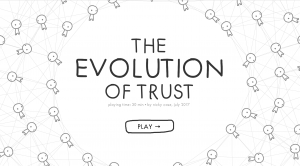
Firstly, try this!
I’m at Montreal’s iX conference exhibiting my project Of the Spheres this week and I can not stop telling people about this insightful game…
The online game “Trust” is interactive philosophy at its most quirky: a playful way of exploring questions of trust through game theory. It’s fun to play because it’s a communication of such satisfying clarity. Play it!
The old adage about learning through experience applies well here! For as you play, the game deftly exposes simple truths on trust and the barriers to trust evolving. For example, it is demonstrated through pretty cartoon tests that trust will not emerge in a zero sum game: a mutuality is needed. Trust comes through repeated interactions across time. Miscommunication and misinterpretation throws a spanner in the works that can lead to broken trust. And conversely excessive co-operation brings its own perils. The game designer Nicky Case has essentially created an intelligent explorable cogitation on the nature of trust. I came away feeling encouraged to grow relationships, create situations that benefit all and communicate clearly so that we can all learn to live and let live.
Interestingly it picks up a theme of my current reading, William James on the “Value of Saintliness” https://csrs.nd.edu/assets/59930/williams_1902.pdf
This interactive game puts one of James’ arguments so well: that a vow to “always cooperate” or saintly behaviour is not a sensible course of action in the world as it is. By the fixed parameters of this game, playing the “copy cat” is the winning move: noticing what the other is doing and mirroring it back to them is the height of social intelligence.
But William James makes an important point that those with “extravagance of human tenderness” and an “over-trust in human worth” can sometimes lift the spiritual stagnation of the world as it is. This is one aspect of the social cauldron that this beautiful interactive game is not showing: people change through interaction with each other. And here is the limit of this game’s set-up: it is a closed system allowing you to run different versions of the same probabilities and see what unfolds. What it lacks is evolution! It’s a problem because in the messy kind of chaos that is our shared reality we find that perhaps the great hope of our time is that the social world is an open system: different kinds of plays and reactions can shake things up and introduce whole new ways of being to agents that might cascade.
Another messy real-world characteristic that the game can’t really speak to is that individual players are not necessarily playing just for themselves (although perhaps many are!) So much of our action comes not only from what is good for us, but for what is good for our children, our loved ones, the community. And in these situations of love and care the notion of being a winner or looser is less motivating than the sense of doing what is right and true. Though a rational weighing up of risk is a good way to think about making an investment or a gamble, something much deeper than the rational mind alone guides us on how to meet the world and each other. Straightforwardly mapping game theory on to human interaction will always hit problems unless it can begin to map agents as truly inter-relational beings.
So what is meaningful relating for the good of the whole? Alas, we can’t calculate this by limiting our view to knowledge of probabilities and logical discernment, for it includes unreasonable acts of good faith, trust, kindness and sacrificing personal gain for the bigger picture. The way of love does not always keep you safe… or winning …or comfortable… but it is involved in encouraging a different way of being.
Playing the copycat will help an agent avoid extending too much trust to an antagonistic player. But the copycat only mirrors the world as it is, and yet the world as it is can transform and needs to transform. And that’s important. This game does show definitively that ignoring suspicion and taking a leap of faith is not the safest way to play the game. And yet it left me contemplating that sometimes unrestrained trusting behaviour has a potential to meaningfully shift things and create high-trust environments where more reasonable behaviour could not. Ultimately, it gets down to questions of who is doing the copying? And who the creating?
I’m inspired by this game: it is simply a beautiful way to compress and communicate complexity. There’s something tongue in cheek about making complexity so neat and sweet. And I’m sold on the idea that a playful interactive approach to philosophy can bring rigour, imagination and fresh perspective to the old questions of virtue and action. Clearly this mode of interactive expressivity can keep on getting deeper and deeper. I’m holding out for Version 2 of this game with evolutionary potentials and an emphasis on social revolution!
Visit https://www.patreon.com/ncase to fund Nicky to keep on innovating